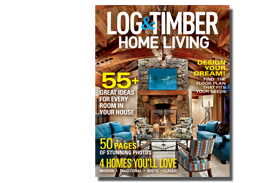
Tedd Benson, owner and founder of Bensonwood.
“In the beginning, frankly, it was just plain hard,” he explains. “At the time, timber framing didn’t have any established contemporary value, so we had to create that impression, always describing what was unique and special about the craft. I didn’t think it would take 20 or 30 years to get very far with it, but sure enough it did.” If there was anyone that was up for the challenge, it was Tedd and his team. As a young man, Tedd took up carpentry to help pay for tuition, and soon found himself on the east coast working in an area where old timber homes and barns were very prevalent.
Soon he found himself working on renovations of 100-, 200-, even 300-year-old buildings. “I found them to be so inspiring, so I started asking, ‘Why don’t we still build this way?’ And to be honest, none of the answers I heard were sufficient. People said it was impractical and it required too many skills. But that was a long time ago,” he says. “After all, this is a technique that has produced some of the best homes in North America, so why don’t we bring it back? After a little bit of time, I set forth to do exactly that.”
After a number of years and thoughtful improvements to the time-honored building method, Tedd had successfully reintroduced timber framing to the modern world through better tools, technology and software, resulting in homes that were more efficient and, in turn, more affordable for his clients. He was also introducing and establishing an architectural idea about what a modern timber home could look like as opposed to the traditional colonial timber frame. Living areas became more open, and the structure became more expressed and visible.
“By then, we had many colleagues around the country who were also doing timber framing, so pretty soon we were all learning from each other,” says Tedd. “That improved our craft and our abilities exponentially. Then our learning wasn’t just internal, but also external.” Now, forty years after his start, Tedd and his team not only specialize in timber frames, but hybrid and panelized homes. In fact, their line of prefab Unity Homes is now bringing high-performance amenities to the masses — a responsibility Tedd feels very passionate about.
“If a civilization is defined by anything, it’s the quality of the homes that people lived in during the height of that civilization. As professional homebuilders, we have a responsibility to create the highest quality buildings we can, and to create a legacy for future generations,” he says. And consumers, he says, have the same responsibility to build smart. “It is so important for people to be focused on the underlying qualities of the building — the structure, insulation and architecture — so, my advice to our clients is that you can always upgrade your amenities, carpets and furniture, but you have this one shot to make a really high-quality building. And that should never be squandered.”











